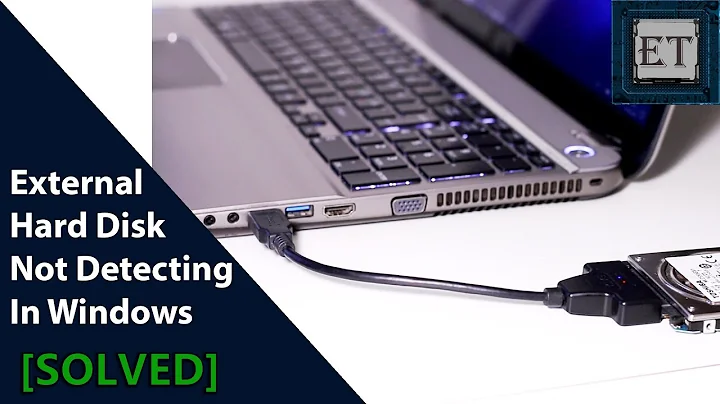NTFS filesystem on external drive isn't recognised: "mount: wrong fs type, bad option, bad superblock on /dev/sdb1"
30,558
First determine what is the filesystem of your external hard disk. You need these packages for the following Windows filesystems:
- exFAT:
exfat-fuse - NTFS:
ntfs-3g - FAT32: already built in the kernel
Install the corresponding packages by running sudo apt install <package>. If the disk is not automatically mounted when plugging in the disk, mount it at the terminal with:
- exFAT:
sudo mount -t exfat <device> <mount_point> - NTFS:
sudo mount -t ntfs-3g <device> <mount_point>
Related videos on Youtube
Author by
Rohan
Updated on September 18, 2022Comments
-
Rohan over 1 year
I have a 1TB WD HDD which works fine on any Windows computer. My laptop only runs Ubuntu Linux and for some reason the hard disk is not being recognized.
Running
fdisk -lgives me this output :Disk /dev/ram0: 64 MiB, 67108864 bytes, 131072 sectors Units: sectors of 1 * 512 = 512 bytes Sector size (logical/physical): 512 bytes / 4096 bytes I/O size (minimum/optimal): 4096 bytes / 4096 bytes Disk /dev/ram1: 64 MiB, 67108864 bytes, 131072 sectors Units: sectors of 1 * 512 = 512 bytes Sector size (logical/physical): 512 bytes / 4096 bytes I/O size (minimum/optimal): 4096 bytes / 4096 bytes Disk /dev/ram2: 64 MiB, 67108864 bytes, 131072 sectors Units: sectors of 1 * 512 = 512 bytes Sector size (logical/physical): 512 bytes / 4096 bytes I/O size (minimum/optimal): 4096 bytes / 4096 bytes Disk /dev/ram3: 64 MiB, 67108864 bytes, 131072 sectors Units: sectors of 1 * 512 = 512 bytes Sector size (logical/physical): 512 bytes / 4096 bytes I/O size (minimum/optimal): 4096 bytes / 4096 bytes Disk /dev/ram4: 64 MiB, 67108864 bytes, 131072 sectors Units: sectors of 1 * 512 = 512 bytes Sector size (logical/physical): 512 bytes / 4096 bytes I/O size (minimum/optimal): 4096 bytes / 4096 bytes Disk /dev/ram5: 64 MiB, 67108864 bytes, 131072 sectors Units: sectors of 1 * 512 = 512 bytes Sector size (logical/physical): 512 bytes / 4096 bytes I/O size (minimum/optimal): 4096 bytes / 4096 bytes Disk /dev/ram6: 64 MiB, 67108864 bytes, 131072 sectors Units: sectors of 1 * 512 = 512 bytes Sector size (logical/physical): 512 bytes / 4096 bytes I/O size (minimum/optimal): 4096 bytes / 4096 bytes Disk /dev/ram7: 64 MiB, 67108864 bytes, 131072 sectors Units: sectors of 1 * 512 = 512 bytes Sector size (logical/physical): 512 bytes / 4096 bytes I/O size (minimum/optimal): 4096 bytes / 4096 bytes Disk /dev/ram8: 64 MiB, 67108864 bytes, 131072 sectors Units: sectors of 1 * 512 = 512 bytes Sector size (logical/physical): 512 bytes / 4096 bytes I/O size (minimum/optimal): 4096 bytes / 4096 bytes Disk /dev/ram9: 64 MiB, 67108864 bytes, 131072 sectors Units: sectors of 1 * 512 = 512 bytes Sector size (logical/physical): 512 bytes / 4096 bytes I/O size (minimum/optimal): 4096 bytes / 4096 bytes Disk /dev/ram10: 64 MiB, 67108864 bytes, 131072 sectors Units: sectors of 1 * 512 = 512 bytes Sector size (logical/physical): 512 bytes / 4096 bytes I/O size (minimum/optimal): 4096 bytes / 4096 bytes Disk /dev/ram11: 64 MiB, 67108864 bytes, 131072 sectors Units: sectors of 1 * 512 = 512 bytes Sector size (logical/physical): 512 bytes / 4096 bytes I/O size (minimum/optimal): 4096 bytes / 4096 bytes Disk /dev/ram12: 64 MiB, 67108864 bytes, 131072 sectors Units: sectors of 1 * 512 = 512 bytes Sector size (logical/physical): 512 bytes / 4096 bytes I/O size (minimum/optimal): 4096 bytes / 4096 bytes Disk /dev/ram13: 64 MiB, 67108864 bytes, 131072 sectors Units: sectors of 1 * 512 = 512 bytes Sector size (logical/physical): 512 bytes / 4096 bytes I/O size (minimum/optimal): 4096 bytes / 4096 bytes Disk /dev/ram14: 64 MiB, 67108864 bytes, 131072 sectors Units: sectors of 1 * 512 = 512 bytes Sector size (logical/physical): 512 bytes / 4096 bytes I/O size (minimum/optimal): 4096 bytes / 4096 bytes Disk /dev/ram15: 64 MiB, 67108864 bytes, 131072 sectors Units: sectors of 1 * 512 = 512 bytes Sector size (logical/physical): 512 bytes / 4096 bytes I/O size (minimum/optimal): 4096 bytes / 4096 bytes Disk /dev/sda: 931.5 GiB, 1000204886016 bytes, 1953525168 sectors Units: sectors of 1 * 512 = 512 bytes Sector size (logical/physical): 512 bytes / 4096 bytes I/O size (minimum/optimal): 4096 bytes / 4096 bytes Disklabel type: dos Disk identifier: 0xca450371 Device Boot Start End Sectors Size Id Type /dev/sda1 * 2048 999423 997376 487M 83 Linux /dev/sda2 1001470 1953523711 1952522242 931G 5 Extended /dev/sda5 1001472 1953523711 1952522240 931G 8e Linux LVM Partition 2 does not start on physical sector boundary. Disk /dev/mapper/ubuntu--vg-root: 915.1 GiB, 982612180992 bytes, 1919164416 sectors Units: sectors of 1 * 512 = 512 bytes Sector size (logical/physical): 512 bytes / 4096 bytes I/O size (minimum/optimal): 4096 bytes / 4096 bytes Disk /dev/mapper/ubuntu--vg-swap_1: 15.9 GiB, 17075011584 bytes, 33349632 sectors Units: sectors of 1 * 512 = 512 bytes Sector size (logical/physical): 512 bytes / 4096 bytes I/O size (minimum/optimal): 4096 bytes / 4096 bytes Disk /dev/sdb: 931.5 GiB, 1000170586112 bytes, 1953458176 sectors Units: sectors of 1 * 512 = 512 bytes Sector size (logical/physical): 512 bytes / 512 bytes I/O size (minimum/optimal): 512 bytes / 512 bytes Disklabel type: dos Disk identifier: 0x0003f448 Device Boot Start End Sectors Size Id Type /dev/sdb1 2048 1953458175 1953456128 931.5G 7 HPFS/NTFS/exFATAnd then I tried this:
mount /dev/sdb1 /mnt -t autoAnd this is what I got:
mount: wrong fs type, bad option, bad superblock on /dev/sdb1, missing codepage or helper program, or other error In some cases useful info is found in syslog - try dmesg | tail or so.I am new to Linux. I did search for the question and I found most of them to have a problem where the hard disk is not recognized while installing. But, I have Ubuntu installed already!
-
 Anthony Wong almost 8 yearsDo you know what is the filesystem used on the external harddisk? Is it exFAT, NTFS or FAT32? To support exFAT, you have to install exfat-fuse by
Anthony Wong almost 8 yearsDo you know what is the filesystem used on the external harddisk? Is it exFAT, NTFS or FAT32? To support exFAT, you have to install exfat-fuse byapt install exfat-fuse. After that, try mounting your hard disk again. -
Rohan almost 8 yearsThe external hard disk has a filesystem of NTFS.
-
 Anthony Wong almost 8 yearsDo you have the
Anthony Wong almost 8 yearsDo you have thentfs-3gpackage installed? -
Rohan almost 8 yearsYes, I got it from here packages.ubuntu.com/precise/ntfs-3g. But what do I do with it? I have the box checked which gives the write access to external devices
-
 Anthony Wong almost 8 yearsFirst of all, you should not use the package from the link you posted above, that is for the 12.04 release, which is old. Type
Anthony Wong almost 8 yearsFirst of all, you should not use the package from the link you posted above, that is for the 12.04 release, which is old. Typesudo apt install ntfs-3gto get the latest. Then runsudo mount -t ntfs-3g /dev/sdb1 /mntto mount the drive, or just plug your external drive and see if it will be auto-mounted. -
foxite almost 8 yearsYou may answer your own question with the solution you got from @AnthonyWong. It will help others :)
-
 Anthony Wong almost 8 yearsI have transformed my comment into an answer.
Anthony Wong almost 8 yearsI have transformed my comment into an answer.
-
-
Anachronist almost 6 yearsHmm. After I installed exfat-fuse, the commad 'mount -t exfat /dev/sda /mnt' returned "unknown filesystem exfat".
-
 Anthony Wong almost 6 years@Anachronist can you check with
Anthony Wong almost 6 years@Anachronist can you check withdpkg -l exfat-fuseifexfat-fusehas really been properly installed? Which Ubuntu release are you using? -
Anachronist almost 6 yearsHuh. You're right, it didn't get installed properly even though I don't recall seeing any errors during installation. I tried installing again, and this time dkpg showed it present and the mount command worked.
![[Solved] The file or directory is corrupted and unreadable | Hard Drive is not accessible...](https://i.ytimg.com/vi/63XPjAzsnCk/hq720.jpg?sqp=-oaymwEcCNAFEJQDSFXyq4qpAw4IARUAAIhCGAFwAcABBg==&rs=AOn4CLB0Uznmuh5AuPjQsPGfd38VtiJnMw)




